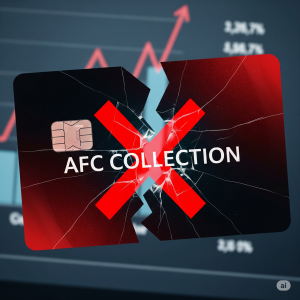
Are you struggling with AFC Collections showing up on your credit report and want them removed? You’re not alone—studies show that nearly 79% of credit reports contain errors, which means it’s critical to act quickly. The good news is that you have the legal right to dispute and remove inaccurate or unverifiable collections from your report.
An AFC Collections entry can seriously harm your credit score, making it harder to qualify for loans, mortgages, or even credit cards. But with the right steps, you can challenge these accounts, protect your rights, and work toward boosting your credit score.
Key Takeaways
- AFC Collections can remain on your credit report for up to seven years if not addressed.
- 79% of credit reports contain mistakes, making regular review and dispute essential.
- Removing AFC Collections can improve your credit score significantly.
- Under the Fair Credit Reporting Act (FCRA), you have the right to dispute any AFC Collections account.
- Simply paying off a collection does not guarantee its removal. • You have 30 days to dispute after receiving a collections notice.
Understanding AFC Collections and Their Impact
AFC Collections is a debt collection agency, and when they report an account against you, it damages your credit profile. Your credit report is essentially your financial re sume , and any negative marks—like collections—lower your credit score. This three-digit score is what lenders use to determine whether you’re a reliable borrower.
To minimize the impact, you must act quickly by:
- Checking whether the debt truly belongs to you
- Understanding your rights under the FCRA
- Disputing errors immediately
- Attempting to settle the debt directly with the creditor
By staying proactive, you can either remove AFC Collections entirely or reduce its negative effect on your financial health.
Your Rights Under the Fair Credit Reporting Act (FCRA)
The FCRA is a federal law designed to protect consumers like you. It ensures that your credit report is accurate, fair, and private. Some of your most important rights include:
- One free credit report from each bureau (Experian, Equifax, TransUnion) every 12 months.
- The right to dispute inaccurate, incomplete, or unverifiable information.
- The right to have incorrect information corrected or deleted within 30 days.
- Negative marks can only stay for a limited time (7 years for collections, 10 years for bankruptcies).
- The right to seek damages in state or federal court if your rights are violated.
The FCRA also limits debt collectors—if you’re represented by an attorney, you can stop direct communication and require that all contact go through your legal representative.
Verifying AFC Collections Debt Legitimacy
Before paying or disputing, make sure the debt is legitimate. You can do this by requesting debt validation from AFC Collections.
- Send a written request for validation.
- They must provide a letter with the original creditor’s name and the exact amount owed.
- By law, this must be sent within five days of initial contact.
- If you don’t dispute in writing within 30 days, the debt will be assumed valid.
Under the Fair Debt Collection Practices Act (FDCPA), requesting validation protects you from wrongful collections and ensures the account truly belongs to you.
How to Dispute AFC Collections Online
- Get your free credit report from Experian, Equifax, and TransUnion. 2. Review it carefully for errors tied to AFC Collections.
- Submit disputes directly online through the credit bureaus’ portals.
- Provide supporting documentation (receipts, correspondence, proof of error).
- The credit bureau has 30 days to investigate and respond. 6. You may also submit disputes directly to AFC Collections.
Successful disputes result in removal or correction of the account. Always keep copies of your submissions for your records.
Creating a Written Dispute Letter
An official dispute letter often carries more weight than an online submission. Your letter should include:
- Your personal identification (name, address, SSN, DOB). • The account details in question.
- A clear statement explaining why the debt is inaccurate. • Supporting documents (proof of payment, correspondence, etc.).
- A direct request that the bureau investigates and removes/corrects the entry.
Always send dispute letters to both AFC Collections and the credit bureau, and keep a copy for your files.
Removing Paid AFC Collections
Even after paying off a debt, the negative mark may remain. One strategy is to negotiate a pay-for-delete agreement, where you pay (or confirm payment) in exchange for removal from your report.
Important points:
- Get the agreement in writing before sending payment.
- Clearly outline the exact payment amount and removal terms. • Keep proof of the agreement and payment.
Without a written agreement, the collection may still remain on your report as “paid”—which still hurts your score.
Strategies for Removing Unpaid Collections
If you haven’t paid the debt yet, you still have options:
- Confirm the debt is valid.
- Negotiate with the creditor directly.
- Request a pay-for-delete deal.
- Review the statute of limitations in your state (making a payment may reset the clock).
By using these strategies, you may get unpaid AFC Collections removed—or at least reduce their impact on your credit.
Working with Credit Bureaus Directly
Sometimes, contacting the credit bureaus (Equifax, Experian, TransUnion) directly leads to faster resolution.
- Request your official credit report.
- Submit disputes through their websites, phone, or mail. • Provide documents backing your claims.
Direct communication often results in quicker updates and ensures your report is more accurate.
Professional Credit Repair Services
If the process feels overwhelming, you can hire a professional credit repair service. When choosing one, look for:
- Proven experience with AFC Collections.
- A strong track record of removals.
- Transparent pricing.
- Positive client reviews.
Though there’s a cost involved, professional services can often remove collections faster and more effectively, saving you time and stress.
Time-Based Removal Options
Even without disputes or negotiations, AFC Collections accounts expire. Under the FCRA:
- Most collections drop off after 7 years.
- Bankruptcies remain for 10 years.
If your account is close to aging off, it may be best to wait rather than pay or dispute. Still, monitor your report to confirm removal once the time limit passes.
Preventing Future Collection Issues
Once you remove AFC Collections, preventing new collections is critical: • Always make on-time payments.
- Keep credit utilization below 30%.
- Avoid unnecessary new credit inquiries.
- Regularly check your credit reports for errors.
You can also set up payment reminders or automate payments to avoid missing due dates.
Legal Remedies and Consumer Protection
If AFC Collections or any debt collector violates your rights under the FDCPA, you can:
- File a complaint with the Federal Trade Commission (FTC). • Sue in state or federal court.
- Seek compensation for emotional distress or damages.
Many states also have additional consumer protection laws that may further limit what collectors can do.
Monitoring Your Credit After Removal
Once AFC Collections is removed, don’t stop there. Monitor your credit regularly using free reports or paid monitoring services. Tools like Experian’s credit monitoring can give:
- Real-time alerts.
- Monthly score updates.
- Notifications about new accounts or inquiries.
This protects you from future errors and keeps your credit profile strong.
Alternative Dispute Methods
In addition to disputes and pay-for-delete, you can try:
- Goodwill deletion requests (asking creditors to remove an account as a courtesy).
- Direct creditor negotiations (sometimes more effective than working with the collection agency).
These methods often resolve disputes faster, with less stress, and at a lower cost compared to legal action.
Rebuilding Your Credit Score
After AFC Collections is removed, focus on rebuilding your credit: • Keep balances below 30% of your limit.
- Make all payments on time.
- Use a mix of credit types responsibly.
- Consider a secured credit card to build positive history. Benefits of a strong credit score include:
- Lower interest rates.
- Better loan terms and higher limits.
- Lower insurance premiums.
- More career opportunities (some employers check credit).

Removing AFC Collections from your credit report is possible—but it requires persistence, knowledge, and organization. By leveraging your rights under the FCRA, disputing errors, negotiating when appropriate, and monitoring your credit afterward, you can take back control of your financial future.
Stay proactive, remain consistent, and focus on building healthy financial habits to ensure long-term credit success.
Frequently Asked Questions (FAQ)
What is AFC Collections?
AFC Collections is a debt collection agency that purchases and collects unpaid debts, which can hurt your credit score.
How does AFC Collections appear on my report?
It typically appears as a collection account, signaling unpaid debt.
How does it affect my credit score?
Collections are highly negative and can cause significant score drops.
What rights do I have under the FCRA?
You can dispute inaccurate, incomplete, or unverifiable AFC Collections accounts.
How can I verify the debt?
Request a debt validation letter from AFC Collections. They must prove it’s yours.
How long do they have to respond?
They must provide validation within 30 days.
What are signs of invalid debt?
Missing documents, incorrect account info, or debts past the statute of limitations.
Can I dispute AFC Collections online?
Yes. Use the credit bureaus’ online portals to submit disputes.
What should I include in a dispute letter?
Your personal info, account details, reason for dispute, and proof documents.
How do I remove paid AFC Collections?
Request a pay-for-delete agreement before or after payment.
How do I remove unpaid AFC Collections?
Negotiate, request pay-for-delete, or check the debt’s statute of limitations.
Can I work directly with credit bureaus?
Yes, by contacting Experian, Equifax, or TransUnion with supporting documents.
Should I use professional credit repair services?
Yes, if you want expert help, but research their reputation first.
How can I remove AFC Collections based on age?
After 7 years, the account should automatically fall off your report.
How do I prevent future collection issues?
Pay bills on time, reduce balances, and check your credit regularly.
What legal remedies exist?
You can file FTC complaints, sue under the FDCPA, or seek damages.
How do I monitor my credit after removal?
Use free annual reports or monitoring tools for real-time alerts.
Are there alternative dispute methods?
Yes—request goodwill deletions or negotiate directly with creditors.
How can I rebuild my credit afterward?
Keep balances low, pay on time, and use credit responsibly to increase your score.
